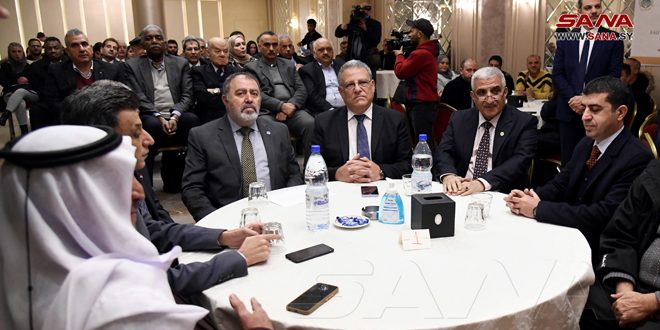Damascus, (ST) – The Arab Center for Studies of Arid Zones and Dry Lands (ACSAD) in cooperation with the Ministry of Agriculture and Agrarian Reform and the Food and Agriculture Organization of the United Nations (FAO), organized a consultative workshop on preparing an agricultural investment map for Eastern Ghouta in the Damascus Countryside Governorate. The workshop was held at the Umayyad Hotel in Damascus.
The two-day workshop reviews and discusses an initiative launched by FAO within its international project “Hand in Hand” to invest in Eastern Ghouta in terms of management, organization and implementation. It targets the local community to develop agricultural practices and establish development models that achieve food security and sustainable development in this region, in partnership with the Ministry of Agriculture, ACS and local community.
The Minister of Agriculture, Engineer Muhammad Hassan Qatna said that the project was chosen to be implemented in the Eastern Ghouta region, and the implementation of its first phase began in 2021 in cooperation with (FAO) and the General Authority for Remote Sensing.
“The second phase is now being implemented in cooperation with (ACSAD) with the aim of establishing a development model for managing Natural resources in the region to achieve the highest economic efficiency”, Qatna added.
Minister Qatana indicated that in the future there will be a development model that will be applied in all regions of Syria targeting farmers in the lands, regions, and villages that need an integrated development program that can later be invested.
For his part, the representative of the FAO in Damascus, Tony Al-Atl stated that the workshop is an episode of cooperation with the Syrian Ministry of Agriculture with the aim of achieving integration between all parties involved in conducting a study and developing an investment plan for the Eastern Ghouta region.
In turn, the Director General of ACSAD, Dr. Nasr al-Din al-Obaid pointed out that the terrorist war that Syria was exposed to led to agricultural changes that caused a decline in agricultural production in Syria in general and in Eastern Ghouta in particular. He indicated that through this workshop, agricultural investment projects will be created to achieve transformative industries that achieve food security and stability and provide additional income for the population in these areas by achieving economic, social and agricultural development in Eastern Ghouta.
In turn, the Director of Agriculture in the Damascus Countryside, Engineer Irfan Ziadeh said that the aim of the workshop is to identify the problems and difficulties that the farmers of Eastern Ghouta suffer from, especially after terrorism destroyed the infrastructure of the agricultural sector in it.
He added that the aim of the workshop also is to know the problems that face the farmers of Eastern Ghouta and to know the solutions proposed by them so that interventions can be developed within this project and to support, develop and advance the agricultural process in Eastern Ghouta.
Raghda Sawas

